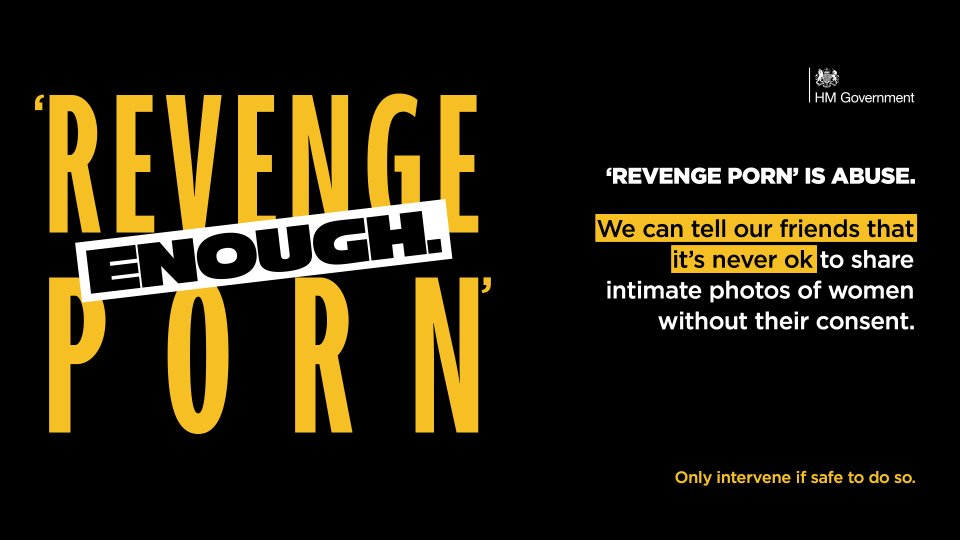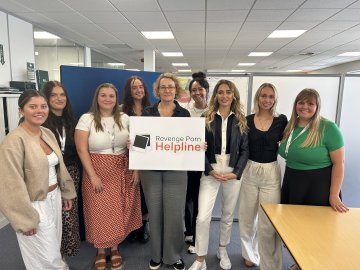We all have the power to stop the abuse of women and girls – whether in real life or online. That’s the message of the ENOUGH campaign launched by the government this week, calling on everyone to take a stand and step in when you see someone being abused.
The campaign, which was initially launched in March this year, focused on challenging perpetrators that violence against women and girls would not be tolerated by society – whether offline or online.
The second phase of the campaign being rolled out this week, focuses on bystanders and provides them with practical tips and advice on how to spot and safely intervene when they see abuse taking place against women and girls. There are small acts of recognition and support which can prevent abuse and help to create a society where women and girls are equal, respected and safe.
It also signposts victims to support or reporting services so they can get the help they need, as well as continuing to encourage individuals to reflect on their behaviours.
Physical or Online Abuse
Violence, harassment and abuse against women and girls (VAWG) happen every day – whether it’s being physically groped in a bar or having intimate images shared online without consent.
Abuse takes many forms and can be words or actions, physical or through technology and can be inflicted by a partner, ex-partner, family member, friend of stranger. If it causes harm, demands, distresses or frightens - it is abuse.
Bystanders, whether a family member, friend or a stranger, can intervene if they see any VAWG behaviours and the campaign also covers concerns about personal safety or that matters could make things worse by taking action. One small act of support can make a big difference.
Possible Scenarios To Offer Support
The campaign looks at different scenarios, such as :
- If you saw a man harassing a woman, what would you do?
- If you saw your friend uploading someone else’s nudes without their consent, what would you do?
- If you saw him touching her without her consent, what would you do?
- If you heard him shout sexist comments, what would you do?
- If you saw your friend being controlled by her partner, what would you do?
The campaign highlights that “when abuse towards women and girls goes unchecked, it becomes normalised. If the people who carry out this behaviour think it’s normal or even acceptable, the abuse can escalate. Women may go on to suffer even more serious violence and trauma”.
“That’s why acts that some people see as ‘trivial’ or ‘harmless fun’ need to be challenged. By standing against all forms of abuse, and by holding perpetrators accountable, we can create a society where women and girls are equal, respected and safe”.
VAWG Behaviours included in the campaign are:
- Verbal sexual harassment / street harassment – catcalling, unwanted persistent sexual comments/abusive comments, following or cornering someone, etc.
- Physical sexual harassment – groping, unwanted sexual touching/touching someone without consent.
- Intimate image abuse, known as ”revenge porn” – sharing someone else’s nudes without consent.
- Cyber flashing – sending nudes without consent.
- Online abuse – sending abusive or unwanted sexual messages.
- Coercive control – controlling or threatening a partner or family member, forcing a partner or family member into doing things.
- Workplace harassment – sexual harassment at work by a boss or colleagues – inappropriate comments, sexual pressure, unwanted physical contact.
Letting acts of abuse pass can make the people who commit them think their behaviour is acceptable.
If you want to support a victim of abuse, let them know sensitively you’re concerned about their safety. Help them to realise that they are not alone, and that there are people and organisations available that can help.
At SWGfL, we provide helplines and services for victims of online abuse. If your intimate images have been shared without your consent, reach out to The Revenge Porn Helpline.






